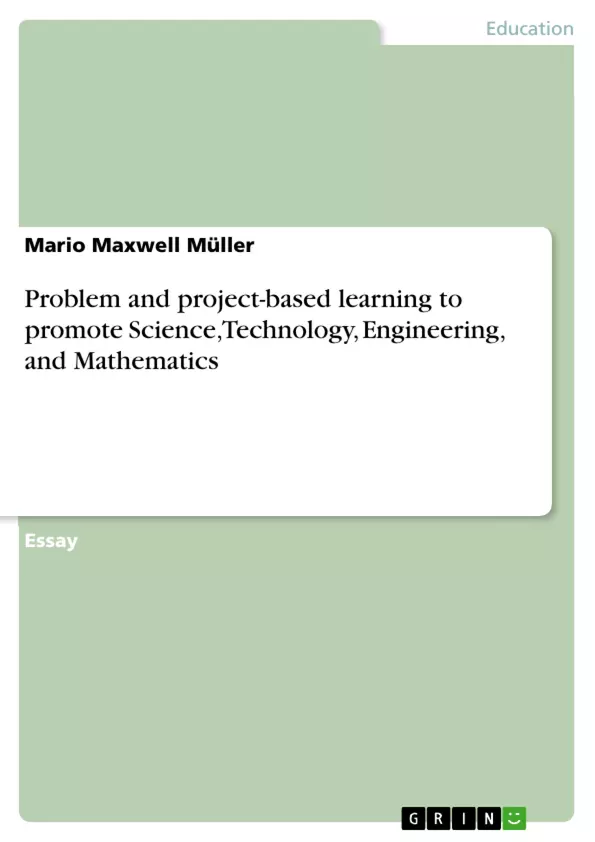The following research essay will discuss the advantages and disadvantages of the problem and project-based learning to promote STEM within an International School, where most curriculum integrates the International Baccalaureate programme for PYP, MYP and DP. In inquiry-based learning setting it is important for teachers to consider incorporating both problem and project-based learning, and emphasise the importance of students showing a particular interest in STEM, and how it can be beneficial for extending their knowledge and understanding of culminating both Science, Technology, Engineering, and Mathematics together to enhance their learning opportunities. Furthermore, it is imperative to create instructional activities to stimulate and motivate students to want to become actively engaged in lessons. In terms of class projects and assignments, teachers can incorporate several different strategies to support students regularly and consistently.
Inhaltsverzeichnis (Table of Contents)
- Abstract
- Introduction
- Relevance and sources of information
- Understanding of Problem/ Project-based learning
Zielsetzung und Themenschwerpunkte (Objectives and Key Themes)
This research essay explores the advantages and disadvantages of problem and project-based learning in promoting STEM within an International Baccalaureate (IB) school setting. It emphasizes the importance of student interest in STEM and the benefits of integrating Science, Technology, Engineering, and Mathematics to enhance learning opportunities. The essay also highlights the need for engaging instructional activities and strategies to support students in their project work.
- The advantages and disadvantages of problem and project-based learning in promoting STEM.
- The importance of student interest in STEM and its benefits for learning.
- The integration of Science, Technology, Engineering, and Mathematics to enhance learning opportunities.
- Engaging instructional activities and strategies to support students in project work.
- The alignment of problem and project-based learning with the IB curriculum and its focus on STEM initiatives.
Zusammenfassung der Kapitel (Chapter Summaries)
- Abstract: Provides a brief overview of the research essay, focusing on the advantages and disadvantages of problem and project-based learning in promoting STEM within an IB school setting. It emphasizes the importance of student interest in STEM and the benefits of integrating Science, Technology, Engineering, and Mathematics to enhance learning opportunities.
- Introduction: Introduces the topic of problem and project-based learning and its potential to enhance student learning in STEM fields. It highlights the importance of student motivation and engagement in this approach.
- Relevance and sources of information: Explores the difference between problem-based and project-based learning, drawing on literature to emphasize the importance of critical thinking, collaboration, and real-world problem-solving skills.
- Understanding of Problem/ Project-based learning: Delves into the key characteristics and principles of problem and project-based learning, highlighting their similarities and relevance to STEM education. It connects these approaches to the IB curriculum's focus on STEM initiatives and the development of student skills such as communication, critical thinking, and research.
Schlüsselwörter (Keywords)
The primary focus of this essay is on problem and project-based learning as a method to promote Science, Technology, Engineering, and Mathematics (STEM) within an International Baccalaureate (IB) school setting. Key themes include the integration of STEM disciplines, student motivation and engagement, collaborative learning, and the application of real-world problems in educational settings. Further key terms are: inquiry-based learning, critical thinking, innovation, and the development of student skills such as communication, critical thinking, research, and self-management.
Frequently Asked Questions
What is the difference between problem-based and project-based learning?
While both are inquiry-based, problem-based learning often starts with a specific question to solve, whereas project-based learning involves a longer process to create a final product.
How does STEM integration benefit students in International Schools?
Integrating Science, Technology, Engineering, and Mathematics helps students see real-world connections and enhances their critical thinking and innovation skills.
Does this approach align with the International Baccalaureate (IB) curriculum?
Yes, the essay specifically discusses how these methods support the PYP, MYP, and DP programs by fostering communication, research, and self-management skills.
What are the main advantages of project-based learning for STEM?
Advantages include increased student motivation, active engagement, and the development of collaborative problem-solving skills.
What strategies can teachers use to support students in STEM projects?
Teachers can incorporate instructional activities that stimulate interest and provide regular guidance and feedback throughout the project phases.
- Citation du texte
- Doctor of Philosophy in Arts, Social Sciences, and Education Mario Maxwell Müller (Auteur), 2022, Problem and project-based learning to promote Science, Technology, Engineering, and Mathematics, Munich, GRIN Verlag, https://www.grin.com/document/1282236



